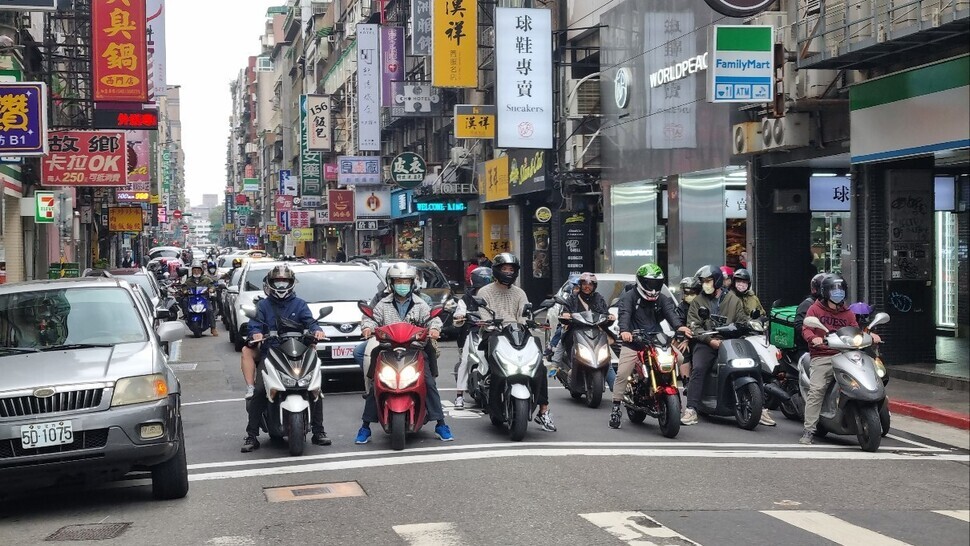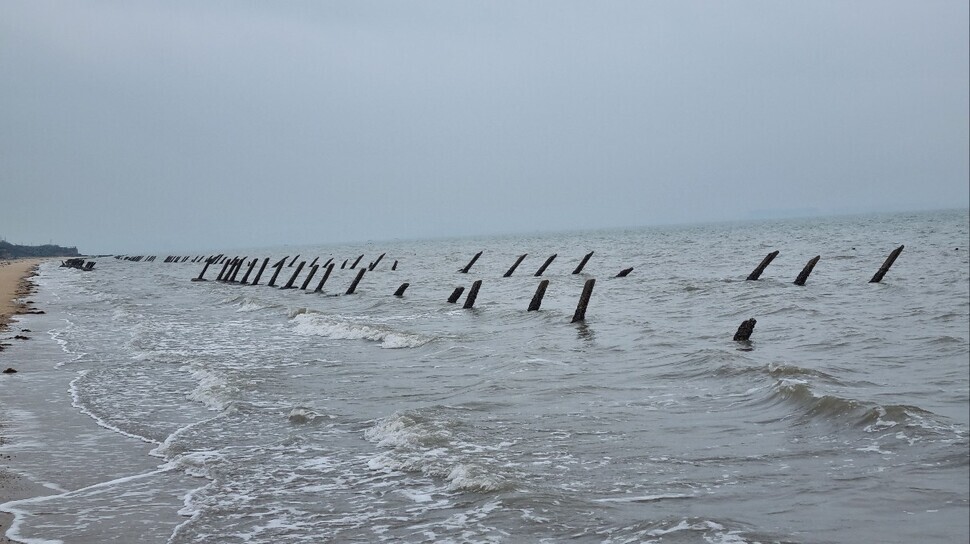hankyoreh
Links to other country sites 다른 나라 사이트 링크
[Reportage] Growing skepticism in Taiwan — not about China, but the US

“The US has diplomatic ties to Ukraine, but it didn’t send its soldiers when Russia invaded. Taiwan doesn’t even have diplomatic relations with the US. It doesn’t seem reasonable to believe the US would send troops to Taiwan in an emergency.”
Huang Po-er, a 20-year-old student at National Quemoy University on the Taiwanese island of Kinmen, said his feelings about the US had changed a lot over the past year or two.
Speaking to the Hankyoreh on a rainy day last March 29, he said he used to believe the US would actively come to Taiwan’s aid if China invaded — but he has fewer expectations of that these days.
“Recently, I’ve been thinking it would benefit Taiwan’s national security for us to improve our relationship with China,” he explained.
“While we ought to maintain some distance, I don’t think it’s good for us to fight all the time the way we do now,” he added.
Kinmen is located around 200 kilometers from the main island of Taiwan — and a mere 2 kilometers from the city of Xiamen in China’s Fujian Province.
Chang Chung-ti, a 20-year-old at the National University of Kaohsiung in southern Taiwan, echoed the sentiment.
“Taiwan needs to build its own strength,” he urged.
“The US is an important country to Taiwan, but we shouldn’t depend on it too much,” he added.
The city of Kaohsiung has long leaned heavily toward the ruling Democratic Progressive Party, which is strongly pro-US and pro-independence.
With a presidential election scheduled nine months from now, in January 2024, signs of growing skepticism about the US have been evident in Taiwan.
As China shows no hint of giving up on its aim of unifying by force, Taiwan has been heavily dependent on security assistance from the US, including weapon sales. But Taiwanese attitudes toward the US have shifted sharply since the war in Ukraine started in late February 2022. The traditional belief in relying on the US has given way to a more skeptical stance.
While the US has provided over US$35.1 billion in military assistance for the war in Ukraine, it has avoided becoming directly involved, citing the need to avoid a potential third world war.
A survey of 1,072 adults conducted last February by the Taiwanese Public Opinion Foundation (TPOF) showed 46.5% of respondents answering “no” when asked whether they believed the US would send troops in the event of a Chinese invasion of Taiwan, compared with 42.8% who answered “yes.”
When participants were asked the same question in October 2021 — four months before the war in Ukraine broke out — more than twice as many (65%) predicted the US would send troops than those who predicted it would not (28.5%).
Where the major issues in Taiwan had once centered on questions of independence or unification with China, the key debate across society today has been whether Taiwan should adopt a more pro-Beijing or pro-Washington position.
The change reflects the situation since 2018, as Taiwan has become a geopolitical battleground where the US and China have been clashing, while China has been ratcheting up its military threat to Taiwan under the leadership of President Xi Jinping. The US’ attitude on the war in Ukraine has been another factor contributing to the complex splintering of Taiwanese public opinion.
This trend has also been reflected in the actions of former Taiwanese President Ma Ying-jeou of the opposition Kuomintang, who arrived in China for an 11-day visit on March 27, and current President Tsai Ing-wen of the ruling Democratic Progressive Party, who left two days later, on March 29, on a Central America visit that included a stop in the US.
The Kuomintang, which represents Taiwan’s conservative side and held power for many years, has adopted a policy focus of promoting the economy through interchange with China. The Democratic Progressive Party, which began winning presidential elections in the 2000s, has advocated beefing up national security and the economy through a stronger alliance with the US.
Both Ma and Tsai’s trips had representatives of the other side heading to the airport to demonstrate in opposition.

As cracks have formed in the Taiwanese public’s faith in the US, calls for increased interchange with China have been working their way in. A primary reason for this is the mood of fatigue over the security worries that have arisen as relations with Beijing have soured during the Tsai administration.
An even bigger factor is unhappiness about livelihood issues. Last year, mainland China accounted for 38.8% of Taiwan’s total exports. Around 2.71 million Chinese tourists visited Taiwan during the pre-pandemic year of 2019 — representing 22.9% of all tourist visits.
“It seems like the US is only concerned about selling weapons to Taiwan,” said Kao Yu-pan, 29, while speaking to the Hankyoreh at Hsinchu Science Park. The park houses many of Taiwan’s high-tech companies, including chipmaker TSMC.
“A lot of Chinese people come to Taiwan for tourism, and they spend a lot of money. We need a lot of tourists coming here from the mainland so that our livelihoods improve,” Kao said.
This may explain why another TPOF survey in January showed only 34.9% of respondents saying they were “satisfied” with the current administration’s economic achievements, while 51.7% said they were “not satisfied.”
With a 2022 per capita gross national income of US$33,565, Taiwan ranked ahead of South Korea (US$32,661) — but the starting salary for university graduates is around half as high, at the equivalent of 1.2 million–1.5 million won per month (US$903-$1,130). The rewards of economic growth have not been evenly distributed.
But Taiwanese identity has been a more important factor than demands for increased interchange with China.
“It’ll be hard to find anyone in Taiwan who wants unification with China,” said one company employee in their 30s who spoke to the Hankyoreh in Taipei.
“I agree that we should improve our relationship with China, but we need to maintain the right distance,” they suggested.
Any potential support for reunification in Taiwan was effectively silenced by the wave of “Sinicization” in Hong Kong since 2019, when people took to the street to oppose extradition legislation there. Most analysts have concluded that China’s hard-line policies on Hong Kong just before the last presidential election are what allowed Tsai to win reelection in 2020, even after her approval rating dipped as low as 20% in 2018.
According to a survey conducted by the election research center at Taiwan’s National Chengchi University, only 7.2% of Taiwanese respondents supported unification as of late last year — down by more than half from 15.9% in 2018.
Beijing is aware of this fact, and it has adopted a softer tact toward Taiwan than last year in the lead-up to next January’s presidential election. The military response to Tsai’s US visit was markedly less intense than when then-US Speaker of the House Nancy Pelosi visited in August 2022.
By Choi Hyun-june, Beijing correspondent
Please direct questions or comments to [english@hani.co.kr]

Editorial・opinion
![[Column] When ‘fairness’ means hate and violence [Column] When ‘fairness’ means hate and violence](https://flexible.img.hani.co.kr/flexible/normal/500/300/imgdb/original/2024/0516/7417158465908824.jpg) [Column] When ‘fairness’ means hate and violence
[Column] When ‘fairness’ means hate and violence![[Editorial] Yoon must stop abusing authority to shield himself from investigation [Editorial] Yoon must stop abusing authority to shield himself from investigation](https://flexible.img.hani.co.kr/flexible/normal/500/300/imgdb/original/2024/0516/4417158464854198.jpg) [Editorial] Yoon must stop abusing authority to shield himself from investigation
[Editorial] Yoon must stop abusing authority to shield himself from investigation- [Column] US troop withdrawal from Korea could be the Acheson Line all over
- [Column] How to win back readers who’ve turned to YouTube for news
- [Column] Welcome to the president’s pity party
- [Editorial] Korea must respond firmly to Japan’s attempt to usurp Line
- [Editorial] Transfers of prosecutors investigating Korea’s first lady send chilling message
- [Column] Will Seoul’s ties with Moscow really recover on their own?
- [Column] Samsung’s ‘lost decade’ and Lee Jae-yong’s mismatched chopsticks
- [Correspondent’s column] The real reason the US is worried about Chinese ‘overcapacity’
Most viewed articles
- 1China calls US tariffs ‘madness,’ warns of full-on trade conflict
- 2[Editorial] Yoon must stop abusing authority to shield himself from investigation
- 3[Column] When ‘fairness’ means hate and violence
- 4[Column] US troop withdrawal from Korea could be the Acheson Line all over
- 5[Column] How to win back readers who’ve turned to YouTube for news
- 6[Book review] Who said Asians can’t make some good trouble?
- 7US has always pulled troops from Korea unilaterally — is Yoon prepared for it to happen again?
- 8Naver’s union calls for action from government over possible Japanese buyout of Line
- 9Could Korea’s Naver lose control of Line to Japan?
- 10DongA Ilbo and the government are told to apologize for past civil rights violations